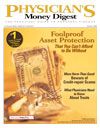Take an Active Role in Your Retirement
First, there was the combinedwhammy of the tech wreckand the post-9/11 recessionthat battered our 401(k)s.Next, inflation in healthcare and education costs further divertedindebted consumers from concentratingon retirement. Now, headlinesare surfacing that any company facingtough times can pull the rug out fromunder its retirees hoping for the traditionalthree-legged stool of retirement—savings, Social Security, andpension. Granted, many physicians inprivate practice don't even have thepossibility of a pension, but they maybe relying on a nonphysician spouse toreap the benefits of a pension plan.
For retirees facing a sudden loss ofpensions and benefits, there are reallyvery few options, except going back towork or turning home equity into a personalbank. So the time to start takingon the lion's share of your retirementresponsibility is now, whether you're 5,10, or 20 years away from hanging upyour white coat.
One general tip:
If you're not certainwhere you stand, get some help. Ifyou've never sat down with a financialadvisor, it may be time to get a secondopinion on your retirement readiness.The meeting may yield some ugly news,but it's better to know the options thancross your fingers.
The following are some topics youmay want to address in your retirementreadiness meeting:
•Explore the meaning of retirement.It's arguable that traditionalretirement is going to be dead for manyof us. So you may want to start thinkingabout a second part-time career or newways to earn income.
•Think about an annuity. Annuitiesare investments that provide fixed orvariable payments to the investor over aset period of time. The collapse of traditionalplans is putting new focus on theannuity business, and it's worth talkingabout with an unbiased expert.
•Do a retirement spendingdress rehearsal. In the last few yearsbefore retirement, see if you are able tolive as if you're already retired. Give upthe lattes and the pricey clothes anddinners. See if you can live with asmaller car or a used one. Retirement iseasier if you can downshift into it,from a monetary standpoint.
•Get in shape—physically. It maybe strange to hear health advice tied toyour financial well-being, but it shouldbe one of the first things you consider.That's because the numbers on a bathroomscale, blood pressure monitor, orcholesterol report can dramaticallyaffect the cost of your health care andinsurance premiums going into retirement.You'll find that preexisting conditionscan boost your premiums—orpossibly cause you to be denied coverage.That's a very ugly surprise goinginto the years when you're going toneed health care coverage the most.
•Consider a career shift. It maybe a bit extreme to switch jobs justbecause a particular employer has betterbenefits and savings options. But if theposition (ie, a place in a group practiceor as a member of hospital staff) appealsto you, and you can make a movewithout endangering what you'vealready accrued, why not consider it?
•Use your catch-up options.Various IRA and 401(k) options allowyou to make additional contributionsover standard savings limits above theage of 50. Make sure you know whatthose additional amounts are and takefull advantage of them.
•Do an investment inventory. Ina 30-to 40-year career, you may havegathered bits and pieces of pension benefits,personal savings, and investmentsalong the way. Likewise, there might beinsurance policies, savings bonds, andother small investments that may haveslipped by your attention. A reevaluationof retirement options should beginwith a full accounting and reorganizingof all investment and savings assets,preferably in an outline that's easy foryou and your advisor to access.
Think about health savings accounts.Today, there are strict limitsand spending rules for health savingsaccounts, but if some lobbyists gettheir way, there might be a day whenhealth savings accounts can become along-term savings solution similar toa 401(k) plan. Consider getting intothe pretax savings habit with healthcare dollars just in case more flexibilityis awarded to these accounts inthe future.
Reprinted with permission from the Financial Planning Association(www.fpanet.org), the membership organization for thefinancial planning community.
